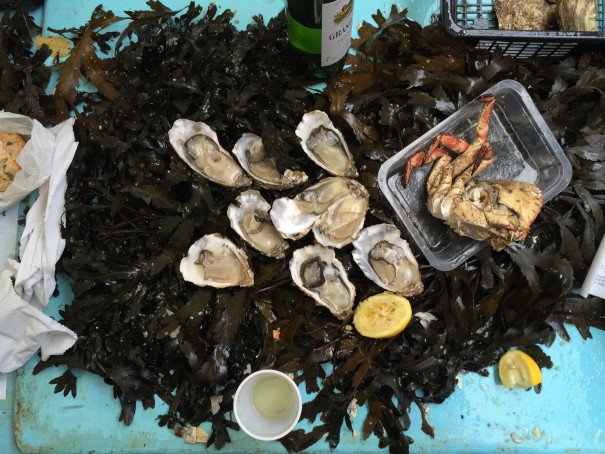
A Historic International Agreement Demands Oysters and Wine for Breakfast

A Historic International Agreement Demands Oysters and Wine for Breakfast
Oysters in the Marché Bastille
In Paris, oysters are a celebration: for a party, for a Joyeux Noël, a bonne année. Half of the huîtres eaten every year in France—Europe’s largest producer and consumer of them—are ingested between Christmas and the coming of the New Year.
The year was coming to an end; a very long 2015 indeed. Endings of things are worth a pause, a commemoration. This time, it needed a celebration.
I didn’t think I would cry. I got up from the floor, next to two grey-suited men embracing, and looked around in the plenary dark. On enormous ceiling-hung screens, U.N. climate chief Christiana Figueres was pumping her fists in the air, eyes brimming over.
In the overflow hall, 195 countries were on their feet in a roar of joy, a flood of relief: all trying to take smartphone photographs and applaud at the same time. Translation headsets fell to the floor. French Foreign Minister Laurent Fabius gave a thumbs up. People held hands, raised them aloft. Everywhere, exhausted negotiators were openly sobbing.
Cross-legged on the carpet, I exhaled. And between the cheering and blurry laptop words, my breath came in heaving hiccups as history happened around me in each hug, each sigh, on each wet cheek.
It’s been such a long road since the 2009 climate conference in Copenhagen, I managed to say on the radio, in tumbling words: all these years, those fights and late nights and justified cynicism, and now, we’ve done it, even though no one thought we could. We’ve finally managed to agree.
There was a party; organized by activists, attended by all. In a club in downtown Paris, with sticky floors and beer in plastic pint cups, people who hadn’t slept in days chose not to sleep for one more night. As we got off the bus, Parisian pedestrians shouted their congratulations.
Christiana came, proud daughter in tow. Golf-shirted U.S. climate envoy Todd Stern did the YMCA and took selfies with sweaty young ladies. The head of the E.U. delegation, Luxembourg’s environment minister, shook her hair loose, dancing nose-to-nose and hip-to-hip with a man in tight jeans. We danced ’til sunrise and emerged into a new world.
I’d been dreaming of this breakfast for days.
We meet at the Marché Bastille, round the corner from the tacky fun fair, past the rows of polyester hats and clothes sold in cellophane packets. There are only four of us, despite promises from a dozen; others are in hotel beds, draped with laptops and sleep.
There have been other meals, after other negotiations, in other places: Cancun, Durban, Doha. Sometimes, there isn’t a chance for a goodbye; mostly, no cause for celebration. This time, in the 11th arrondissement, we’ll linger.
I’m late. I find them already eating, pressed up against a turquoise trestle table in a throng of coats. Emmett from PRI has found a bottle of something white with a vague hint of chardonnay. He produces another plastic cup.
There are nests of kelp draped over plastic, scattered with calcified debris. From the laminated Tarifs Dégustation, I choose the Spéciales over the Huîtres Fines.
Last week’s discovery of the Thalassa stall at the marché had come too late: there was only time for last orders—a single oyster—said écailleur Louis, before the police came to chase them away. I asked for a pied de cheval, the size of my palm.
“You’re not sleeping alone tonight, are you?” Louis had asked me, entirely seriously.
It was an order deemed serious enough by Osman, a Senegalese engineer, replete with enormous cigar and jaunty chapeau, for an invitation to their weekly oyster party.
Today, écailleur Louis is multitasking, shucking knife in one hand, bottle of muscadet in the other.
He assembles a cluster of happiness. The huîtres spéciales are sweeter than the Fines with their hint of iodine; raised off the coast of Normandy with the flavors of the Channel filtering through their bodies. Naturally spawned in April, they are now beautifully fat.
I prod with a terrifyingly sharp, candy-pink plastic shucking knife, trying not to cut my tongue while scraping the oyster into my mouth, adductor muscles and all. They are masculine, metallic, sea sweet, with a taste of noisette on the tongue.
Osman brings us bread spread thickly with butter. There are crabs, too, boiled, cold; perfect in their simplicity. Louis turns one upside down for me, bashes it against the table until it falls apart. Emmett cracks the legs with his teeth. I scrape the tomalley with the side of my thumb, and lick. Podcast producer Helen is picking from a plastic bag of tiny steamed mussels, fat and juicy and brimming over.
The turquoise plastic foldout table is a mélange of salt-sweet. There is something honest, almost primal, in its purity. It is a celebration of contrasts, gentle and extreme, a place to eat to honour the coming together of everything that’s been before. A place for new beginnings.
There is oyster brine on my coat, running down the inside of my sleeve. It makes the webbing between my fingers sticky.
I hold out the oyster shell. Louis upends the bottle of muscadet into the brine and grins. I sip as the salt and sweet swirl together. It tastes like tears.